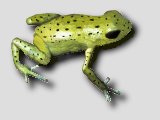Andinobates altobueyensis
| Andinobates altobueyensis | |
|---|---|

| |
| Scientific classification | |
| Domain: | Eukaryota |
| Kingdom: | Animalia |
| Phylum: | Chordata |
| Class: | Amphibia |
| Order: | Anura |
| Family: | Dendrobatidae |
| Genus: | Andinobates |
| Species: | A. altobueyensis
|
| Binomial name | |
| Andinobates altobueyensis (Silverstone, 1975)
| |
| Synonyms | |
|
Dendrobates altobueyensis Silverstone, 1975[2] | |
Andinobates altobueyensis (synonyms ) is a species of frog in the family Dendrobatidae. It is endemic to Alto del Buey mountain in the Serranía del Baudó range, in the Chocó Department of western Colombia.[3][4] Its common names include Alto de Buey poison frog, golden poison-arrow frog, and golden poison frog.[3]
Description
The holotype, an adult female, measured 17 mm (0.67 in) in snout–vent length. The adult male in the type series measured 15.5 mm (0.61 in) in snout–vent length; the other specimens were juveniles or not measured. These frogs are entirely yellow of various shades (yellow, greenish yellow, or golden); some individuals have small black spots on the dorsum, others also on the venter. The skin of back is slightly granular. The tympanum is round and has its postero-dorsal part concealed. Both fingers and toes lack fringes and webbing.[2]
Habitat and conservation
Its natural habitat is humid pre-montane forest at elevations of 980–1,070 m (3,220–3,510 ft) above sea level.[1][4] It lives on the ground and in bromeliads.[1] The tadpoles probably live in aroid leaf axils—almost all axils near the summit of Alto del Buey contained a tadpole, but it is not certain that they were this species, as opposed to Andinobates minutus.[2]
This frog has a very restricted range, and there is risk of habitat loss caused by smallholder agricultural activities, logging, and human settlement.[1]
References
- ^ a b c d IUCN SSC Amphibian Specialist Group. 2017. Andinobates altobueyensis. The IUCN Red List of Threatened Species 2017: e.T55171A85892262. https://dx.doi.org/10.2305/IUCN.UK.2017-3.RLTS.T55171A85892262.en. Downloaded on 03 January 2019.
- ^ a b c Silverstone, P. A. (1975). "A revision of the poison-arrow frogs of the genus Dendrobates Wagler" (PDF). Science Bulletin. 21. Natural History Museum of Los Angeles County: 1–55. Archived from the original (PDF) on 2008-08-07. Retrieved 2016-09-11.
- ^ a b Frost, Darrel R. (2016). "Andinobates altobueyensis (Silverstone, 1975)". Amphibian Species of the World: an Online Reference. Version 6.0. American Museum of Natural History. Retrieved 11 September 2016.
- ^ a b Acosta-Galvis, A.R. (2016). "Andinobates altobueyensis (Silverstone, 1975)". Lista de los Anfibios de Colombia V.05.2015.0. www.batrachia.com. Archived from the original on 10 April 2016. Retrieved 11 September 2016.

